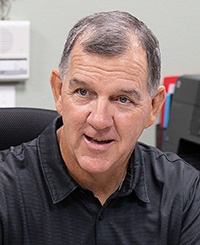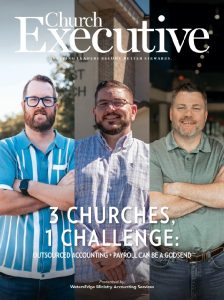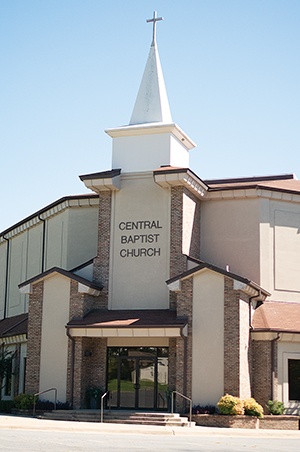
Third-party ministry accounting, payroll services can be a Godsend for church leaders who are overwhelmed, uncertain — or both
By RaeAnn Slaybaugh
Change is hard — but does it need to be?
Surprisingly, if we’re talking about outsourcing your church’s financial systems and processes, the answer is no.
At least, that’s what these three church leaders would tell you. And here’s why.
Central Baptist Church in North Little Rock, Ark., Church at the Mill in Moore, SC, and First Baptist Church Seminole in Seminole, Okla., are three different churches, to be sure. But they have one thing in common: limited administrative bandwidth — and the need to outsource their ministry accounting services.
 Ken Fisher, Executive Pastor @ Church at the Mill
Ken Fisher, Executive Pastor @ Church at the Mill
In 2012, Ken Fisher retired after 30 years in the financial services and healthcare industries. His last role was as vice president of operations strategy for CVS.
Fisher had long been called to ministry. After turning 50, he enrolled full-time at Dallas Theological Seminary, obtaining a Master of Arts degree in Christian Leadership.
In 2016, he was connected with a church in South Carolina looking for an executive pastor: Church at the Mill. He joined the staff seven years ago as its executive pastor.
Church at the Mill is one of the fastest-growing churches in America, with three locations and 120+ employees.
In 2022, the church decided to outsource its payroll services; Fisher was instrumental in this migration.
 Rick Geist, Finance Committee Chair and Deacon @ FBC Seminole
Rick Geist, Finance Committee Chair and Deacon @ FBC Seminole
In 1997, Rick Geist was transferred to Seminole, Okla., with his job as a financial advisor with Edward Jones Investments. He and his family quickly connected with First Baptist Church, Seminole.
Since then, Geist has spent more than 25 years serving as a deacon at the church.
After retiring in 2019, Geist was placed on the finance team to help oversee First Baptist’s transition to outsourced ministry accounting services amid a somewhat chaotic time.
 Thomas Sewell, Associate Pastor @ Central Baptist Church
Thomas Sewell, Associate Pastor @ Central Baptist Church
In 2014, Thomas Sewell came on staff at Central Baptist Church as its youth minister after nine years of student ministry in Texas.
The first pastor Sewell ever served under — a friend of the current pastor at Central Baptist — connected Sewell with Central’s pastor and the Lord sent his family to North Little Rock, Ark.
In 2020, he became associate pastor of missions and operations. In July 2023, Sewell’s role shifted to missions and discipleship.
When Central Baptist’s 30-year accounting/finance point person began to discuss retirement in 2022, Sewell and his team needed help transitioning to a new financial system.
In all three churches, the vast majority of accounting functions were done — for years and even decades — in-house by a single person or just a few people. It’s a familiar story, no matter how big or small a church might be.

At Central Baptist Church (Central), a mid-size church with 800 in attendance and five full-time staff members, a highly-valued ministry assistant singlehandedly managed membership and finance operations for 32 years. Earlier this year, she announced her intention to retire.
“[Our staff member] did a fantastic job for more than three decades,” explains Associate Pastor Thomas Sewell. “Still, we hadn’t done a good job of cross-training. We had our silos and our lanes, and neither I — nor anyone else — was prepared to step into that role.”
At First Baptist Church Seminole (First Baptist), a small church with three full-time employees and about 300 in attendance, Rick Geist — an accounting services veteran-turned-church finance committee chair and deacon — was navigating a chaotic time in the church’s accounting functions.
For 13 years, one employee kept the books for First Baptist, then an external accountant “put it all together.” In late 2019, the long-time finance secretary left the church. Soon after, the CPA reduced her client load. Geist had a conundrum on his hands.
Around this same time, a similar situation was playing out at Church at the Mill. It’s a large church with three locations, 124 staff members and 4,600 in attendance — one of the fastest-growing in the nation. Here, the church outgrew its in-house payroll functions after expanding from 1,200 in attendance in 2016 to more than 4,600 today.
With the congregational growth came staffing changes.
Although the long-time church secretary was equipped to facilitate payroll when the church was smaller, it now employs 70 church staff and 50 more Early Learning Center employees. Beyond this, the secretary’s payroll process “was basically 20 years in the making,” as Executive Pastor Ken Fisher explains.
“Heaven forbid she had to step out for two or three days before payroll,” Fisher says. “There was just always a risk of our employees not being paid or it being inaccurate.”
Three different churches, three different church executives, three different church sizes, three different church cultures — all of them facing the same challenge. Ultimately, they all chose to outsource their accounting and payroll services to a single entity: WatersEdge Ministry Accounting Services.
All had the same reasons for making the switch.

FBC Seminole’s Lead Pastor Nick Atyia (left) and Rick Geist opted to outsource ministry accounting services amid a somewhat chaotic time at the church.
EASY MIGRATION + TRAINING
The thought of migrating a church’s accounting and finance functions to a third party can strike fear in the heart of even the most seasoned church executive. These three pastors were no exception — even for Ken Fisher at Church at the Mill, the largest of the three.
“Surprisingly, the level of effort on our end was not difficult and the migration was very seamless,” he explains.
It started with the church handing over its tables of payroll information. WatersEdge — with Vice President of Ministry Accounting Services Sarah Barham at the helm — took that information and built records. When small hiccups arose along the way, Fisher says Barham and her team “went above and beyond to make sure the very first payroll was perfect.”

Just a few months later, all 120+ church employees were receiving payroll with the correct tax withholding and all the benefit additions and withholdings, right out of the gate. In total, the migration of payroll services took just two months, beginning in November 2022 and “going live” on January 1, 2023.
And while WatersEdge is the primary facilitator for transitioning “all things payroll” into an online portal, at any point Fisher and his team can check records for accuracy or to answer employee questions, using the same portal.
Thomas Sewell and his team at Central were also surprised at the speed and ease of migrating their ministry accounting services. Sewell and the long-time church finance secretary met by phone with WatersEdge on a Tuesday in late March. Feeling good about the prospect of switching over, Sewell asked when implementation could start; after all, payroll was scheduled for the following Monday. He learned that with the right information handed over, payroll services could be up and running by Saturday. The initial transition took just five days.
For the next three-and-a-half months, the implementation team at WatersEdge walked the church through the remainder of the process.
This timeline was especially impressive given the atypical nature of Central’s existing accounting systems and processes. “The transition team was absolutely phenomenal in answering our questions, being very patient with us,” Sewell recalls. “We made mistakes on our end, and they would catch them and say, ‘Hey, we need to change it and do this instead.’”
At First Baptist, the records didn’t present quite as much of a challenge; even so, the balance sheet was objectively untidy. “And when you start with [a process] like this, you need a tidy balance sheet, meaning the old ending balances and the new beginning balances must match up, even though they might be using different codes and different account titles,” acknowledges Rick Geist, himself a retired finance professional.
RELIABILITY, CONSISTENCY, ACCURACY
Of course, there’s a question: what’s the point of outsourcing something your church can do in-house unless those functions can be done with greater reliability, consistency and accuracy by an outside provider? This is another major benefit of managed accounting services.
For Thomas Sewell and Central, checks-and-balances as well as transparency in accounting are crucial. In both of these respects, he says he feels confident and comfortable with WatersEdge performing these functions as an extension of the church.
“Outsourcing our accounting creates a safety net. This way, our director of operations has eyes on our finances, WatersEdge has people looking at accounts payable and accounts receivable, and it’s not the same person for everything,” he explains. “We have segregated duties. And because of that, I feel like we’re being even better stewards of the money people are trusting us with.”
For his part, Geist also appreciates the reliability of the reporting WatersEdge provides to First Baptist — delivered on the second Wednesday of every month, for the previous month — especially given his church’s recent challenges in this regard.
“Previously, our reports were four or five months behind, which led to internal turmoil on our finance team,” he explains. “We were having trouble getting our budget done; the men and women on the committee were very capable, but they didn’t have reports.”
At the same time, when giving fell off at the church, it compounded pressure and created cashflow issues.
“People got less patient with one another, and our new, young pastor needed information,” Geist recalls. “Meanwhile, our reporting was months behind.”
Now, First Baptist enjoys clear reporting — enough to satisfy any financial information the committee wants to see, and more. “Information on the balance sheet is current and clear,” Geist says. “Trends were much easier to see with our reports showing monthly totals.”
COMFORT WITH COMPLEXITY, RECONCILIATION
For large and growing churches alike, keeping track of the general fund is the easy part; it gets more complicated (and fraught with potential error) when multiple bank accounts and designated funds come into play.
Such is the case at First Baptist, where — prior to outsourcing accounting services — many of these designated-fund amounts were tracked on sticky-notes. Now, WatersEdge’s accounting team has helped the church learn the importance of assigning special in- and out-codes to designated gift initiatives. At First Baptist, this includes funds given to support local mission trips, as well as scholarships to send youth to summer camp; and the church’s seasonal ministry called Love Out Loud, the Christmas store.
“That store’s account might swell up to $10,000 or $20,000, fall to minus-$2,000, swell up again to $15,000, and then go down by $10,000,” he explains. “So, yeah, we rely a lot on the tracking of designated funds, the prompt reporting, and the tag report for things that come and go.”
Another example of designated funds accounting would be a church-owned cabin in nearby Falls Creek, Okla., which generates rental income. While the amounts aren’t very significant, Geist nevertheless says it’s very important that the church keeps this account balance separate.
COVID introduced a new level of accounting complexity for churches receiving relief funds, but WatersEdge stood ready to help churches handle the reconciliation and designation of these funds. Before applying for stimulus relief, Geist called the Ministry Accounting team for advice.
“They said, ‘If you take that money, we’ll create a new profit statement just for those funds,’” he recalls. “They told me, ‘It’ll show separate on your balance sheet, it’ll have a separate payroll item, and it will clear on its own down to zero.’ Which it did. There aren’t enough sticky-notes on earth for us to duplicate that in-house or to report it.”
Better yet, Geist says this accommodation was made at no additional cost.
“Even during COVID, they never came back to us and charged a fee for a second set of reports,” he points out.
REDUCED STAFF COSTS
Although outsourcing accounting services comes at a price, these churches are actually saving money on these functionalities.
For Sewell and Central, the options were limited when their long-time manager of membership and finance operations retired. They could hire someone full-time and train them as a replacement; hire someone full-time to step into a new, web-based financial platform and train them, on a new tool, to do all his or her predecessor had been doing; or — for significantly less — outsource to WatersEdge and hire someone, part-time, to act as a go-between, feeding WatersEdge invoices, receipts, check requests, and scanning deposits. Sewell chose the last option: Central started using WatersEdge’s services in April, hired a part-time director of operations in June, and retired the long-time manager in July.
“Whereas we will spend more than we’d planned this financial year, come next year — if we don’t change anything — the operational costs for finances will be less with WatersEdge and a part-time position than it was with the full-time ministry assistant handling it all.”
After enlisting WatersEdge, Geist and First Baptist opted not to rehire anyone for the position formerly held by the 13-year bookkeeping employee at all. “Imagine having to spend one-third of what you were spending a year and also getting the level of service we’re getting,” he explains.

Church at the Mill — one of the fastest-growing churches in America — decided to outsource its payroll services in 2022.
ALL ABOUT CHURCHES
For these church leaders, familiarity with church accounting was essential when vetting their options.
That’s exactly what Geist says he and his team at First Baptist found with WatersEdge: they are, in his words, church people doing church accounting for churches.
As a retiree and high-level volunteer at the church, he was able to devote a lot of time looking for a new accounting services provider. Geist had a good sense of what was needed, having spent a large part of his own career in accounting for private business and, as such, knowing the difference between that and church accounting.
“You have to understand pastors and the way their payroll works, how they’re self-employed, how they have housing allowances, and so on,” Geist points out.
WatersEdge leaned in to help again — and their expertise was key.
To this end, Geist is grateful for WatersEdge coming in and reconciling bank accounts, credit cards, and more.
“They do so many things we were spending hours doing in-house,” he recalls. “Sarah [Barham] was our point person; she was very hands-on and available. She communicated with our old bookkeeping vendor, with us, and with our banks.
Familiarity with church accounting was also a factor for Ken Fisher and Church at the Mill when he met WatersEdge VP of Ministry Services Bobby Hart — an executive pastor himself — at a conference. Hart provided Fisher with a clear understanding of what third-party payroll services entailed and introduced him to Sarah Barham. She then helped Fisher and his team decide the best plan for migrating their payroll.
It wasn’t the only option on the table at the time; as Fisher recalls, he compared pricing and capabilities with standard payroll providers before committing.
“What really made this an easier decision was meeting with Bobby Hart,” he says. “We talked about the product offering but also about their philosophy: making sure churches are well cared for when it comes to financial services and, in particular, payroll services.”
That, combined with a competitive price structure and a church orientation, checked all the boxes.
Now, with the church’s rapid continued growth, Fisher says he would likely enlist WatersEdge for other financial functions should Church at the Mill decide to go third-party with those in the future. “If we’re going to let something go outside of our four walls, it’s got to be with somebody we can feel incredibly comfortable working with,” he says. “I’m the type that will check you out first, see how you handle this.”
WatersEdge’s familiarity with church accounting was a more baked-in trait for Thomas Sewell and Central because of the organization’s partnership with the Arkansas Baptist State Convention. Even so, Sewell says he “wasn’t married” to going with WatersEdge; he did a fair amount of homework before making that decision.
“I’m also connected with a lot of church planners, so I’d been hearing about WatersEdge for a while,” he says. “Even two years ago, I started asking questions and trying to get a good feel for them.”
As such, when the church’s 30-year accounting/finance point person approached retirement, WatersEdge was top-of-mind. But first, Sewell reached out to several other churches of similar size (and larger) to get a feel for what they were doing with their third-party accounting. This gave him added peace of mind in his choice.
“I really don’t see a concern with our church potentially outgrowing their capabilities,” he explains.
FREED UP FOR MINISTRY
When people choose to work at a church, it usually isn’t because they’re passionate about finance — they’d rather do ministry. In this respect, third-party accounting services are a simple way to free up staff members to do what they really love.
For Church at the Mill, it means no more burdening multiple staff members entrusted with payroll data when the financial secretary is out of the office.
For First Baptist, it means not having to replace a full-time finance secretary — and even lightening the load for the current church secretary. “I’ve asked her many times, ‘How much time do you spend on finance now?’” Geist says. “About an hour a week.” This includes scanning all relevant documents, downloading them to WatersEdge, and communicating with their team as needed. Third-party accounting services have also cut finance meetings at the church to about 30 minutes. If something in the report doesn’t look right, everyone can pull it up on their phone, or it can be cast from a laptop onto a monitor and investigated immediately.
“You can pull it up and say, ‘Why is the custodian cost half again higher than it should be?’” Geist cites as an example. Prior to WatersEdge, this would mean talking to the finance secretary the next day, her calling the payroll service, and the payroll service calling back the next day … a very bulky process,” he says. “Now, we even have the information at the finance meeting.”
At Central, which reinstated annual audits in 2020, Sewell says their auditors are excited about the switch to WatersEdge. With each of the recent audits, Sewell recalls being told, “There’s nothing illegal going on, nothing immoral, nothing unethical, but you could do be doing some things a little bit better to streamline the system.” When he told the auditors about the switch to WatersEdge, they were happy to hear it and even helped with the communications to make sure it helped Central get further in line with General Accepted Accounting Practices.
For 2023’s audit, Sewell will connect the audit team with the WatersEdge team, and it will save Central’s staff hours of pulling reports and submitting financials. “Sometimes we’ve got to take steps into scary territory — change — to be the best stewards we can be with God’s money, but also, to position ourselves to grow,” Sewell points out. “And if we can free up man-hours of just handling finances, then that gives somebody more time to put towards something else, whether it’s ministry or whether it’s answering phones,” he adds.
More than anything, the lesson of these three churches’ experience with third-party church accounting services is: ease of use, reduced costs, and more time church staff can spend focusing on ministering to their congregations.


